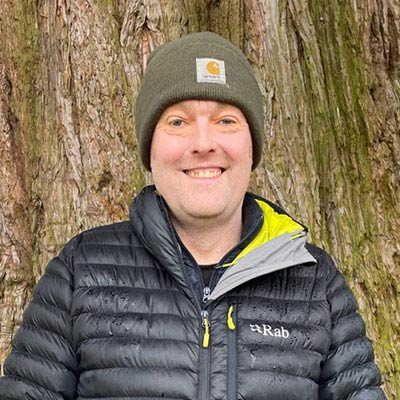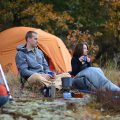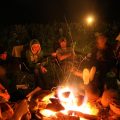Last Updated on December 9, 2019 by Dean Anderson
Are you planning to camp in bear country? If so, you should absolutely go into your trip with a game plan. Because while the bear country is beautiful, it can often be unsafe if you don’t prepare for a potential bear encounter.
How to Camp in Bear Country
The last thing you want during your camping trip is a wild bear wrecking what was supposed to be a fun and relaxing experience. That’s why we’re sharing the ins-and-outs of camping in bear country, from safety awareness to bear proofing tips.
So, you can rest easy and relax knowing you’ve prepped for anything that comes your way.
Choose the Proper Campsite
Before you set up your tent, take a tour of the area to determine if it’s an area that bears tend to frequent. You can determine this by seeing if there are any bear droppings, bear tracks, or claw marks on trees. And if you see grizzly diggings or animal carcasses, be sure to turn around because chances are you’re in a bear’s territory.
Set Up Your Campsite Appropriately
The first step in camping safety is setting up your site appropriately. In bear country, this means strategically distancing where you sleep from the areas in which you cook and eat.
There should be roughly 100 yards between where you eat, where you store food, and where you sleep. The sleeping area should be upwind of those other spots as well. By doing this, you’ll be less likely to attract the attention of a bear should they stumble into your site.
Create a Bear Hang
If you’re in an area with plenty of trees, try to create a bear hang, which is a way of keeping foods out of reach from bears. What you do is put your food in an odor-free, waterproof bag and then string it up into a tree. The most effective bear hangs are generally 10 to 12 feet up and roughly four to six feet away from the tree’s trunk.
There are various methods including the Counter Balance and the PCT (Pacific Crest Trail) methods. The video below explains the PCT (Pacific Crest Trail) style hang, widely used by beginner and expert hikers and campers alike.
One thing we would also recommend is ensuring the food bag is heavy enough. Sometimes the bag doesn’t want to come back down even when you’ve released the stick as the cord can snag on the branch especially if it’s rained while in place. Extra weight from a small rock can help the bag back down to earth.
Bears are clever
It’s important to know that some bears may have experience with bear hangs. And because bears have good memories, they may be able to undo yours if they’ve experienced a similar setup before. It is unlikely with the PCT method as bears, who don’t have thumbs, struggle to get hold of the cord. Still, if you’re nervous about that you can try to store your food in odor-free containers far from your sleeping area. Furthermore this is a good alternative where bear bagging is not allowed.
Keep Your Campsite Clean
To stay as safe as possible, refrain from bringing food anywhere near your tent or sleeping area. This also includes things that have odors like toothpaste and even the clothes you wore while cooking.
If you have leftovers, you should burn them or bury them far away from your campsite. These practices may seem pretty strict, but a clean campsite is a key to not attracting the interest of bears.
Dispose of Anything that Smells
Bears have a keen sense of smell, so it’s important to keep your campsite as odor-free as possible. That means storing your smelly trash in extra airtight plastic bags or even burning it.
Additionally, try to avoid bringing foods that tend to be fragrant like maple syrup and bacon. Bears are more likely to sniff those things out and come to your campsite.
Ready to Camp?
Camping in bear country can be risky, but if you plan in advance everything should be a-okay! By following the tips in this article, you can keep yourself as safe as possible.
Planning a camping trip? Not sure where to start? Check out our prepping guide to set yourself up for camping success!

Eight years ago, I took a risk and left a miserable office job to follow a lifestyle career that involved my love for the great outdoors. I’ve taken my love for camping, hiking and travel to the next level by running my small campground with a friend near Portland, Oregon. It’s for way less money but this has truly been a dream come true and the running involves lots of family and friends.
The next evolution of that was to get online and start allcampingstuff.com. At our campground, I spend a lot of time setting up camping equipment for customers and disposing of the garbage products they leave behind. If I can help just a few people with advice on good camping gear, then this website venture will be worth it.
So, if you want to avoid the duds and spend your money wisely you’ve hopefully come to the right place.








